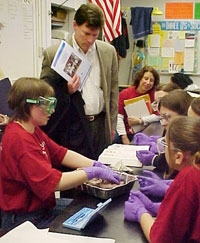For more archives, go to the Advance Archive/Search Page.
Program Encourages Middle Schoolers
To Learn About Health Careers
Nearly 30 eighth graders at Hartford's Bellizzi Middle School stayed after class one day last month to analyze a make-believe crime scene and study the anatomy of a cow's heart.
 |
Karla Kanode, left, a UConn student majoring in biology, explains to satudents at Hartford's Bellizzi Middle School how an animals' heart works. Looking on is State Sen. John Fonfara, D-Hartford.
Photo by Shannon McClure
|
That same day, more than 100 sixth graders learned about careers in dentistry and the basics of good oral health. They also received a free toothbrush.
The events were part of an enrichment program for middle school students sponsored by the Health
Center's Health Careers Opportunity Department. They are funded by a grant from the Aetna Foundation to build interest in health careers among students in groups traditionally under-represented in American medicine and dental medicine.
"The program, Great Explorations, offers many wonderful opportunities for our students in the Hartford Public Schools," says Jacqueline Hardy, senior director for parental and community programs for the District I Public Schools. "The exposure to careers in the medical field reveals new possibilities which perhaps our students never considered."
The eighth grade participants in Great Explorations meet after school twice a month during the academic year for academic enrichment activities.
"The activities are designed to really engage the youngsters and get them excited about science and health care," says Barbara Rau, coordinator of the program. "This year, we had them looking at different systems of the body. We brought in animal bones so the students were looking at cow's hips and getting a chance to see what cartilage really looks like. Another time, they made replicas of lungs, using test tubes, balloons, and straws. Watching the kids, you see light bulbs go off. You can actually watch them being inspired."
Students in Great Explorations also participate in a four-week summer school program that includes classes in English, math, and science, as well as college preparation and awareness. "Many of the participants will be the first in their families to go to college," says Rau. "They often don't understand what they need for college. We let them know that have to take certain math classes and three years of a language. We don't want them to be surprised by the requirements they need for college."
The Great Explorations program started last year with 30 students from Bellizzi Middle School, and was expanded this year to include students in Kennelly and Naylor middle schools.
Guidance counselors in the schools recommend students who have the ability and the interest in college and health care. In sixth grade, the program provides one to two educational programs during the academic year. In seventh grade, the students get together once a month during March, April, and May and spend four-weeks in the summer program.
"Community outreach programs like this are important on many levels," says Ruth Goldblatt, a dentist in the Behavioral Sciences and Community Health Department. "They allow those in the community to see the services we offer and the opportunities available in the health professions. Informing kids about how to stay healthy is a great extra that comes along with the deal."
The middle school program is the most recent addition to the Health Careers Opportunity Program. "A special feature of the Great Explorations program is that it is not a one-time intervention strategy," says Boake Plessy, assistant dean of the Department of Health Career Opportunity Programs. "It is the introductory phase of a series of programs extending throughout the educational spectrum from middle school through college and post-baccalaureate, all designed to make these students more competitive for health professions."
Marja Hurley, professor of medicine, associate dean and director of the careers program, says, "For years, our Health Careers Opportunity Program has provided enrichment for high school students to get them interested in the sciences and health care and help prepare them for college. If we really want to build a pipeline to draw inner-city and under-represented students into the health professions, we have to reach out to them early in their academic careers. We have to provide support and enrichment while they are in college, in high school, and even before that, while they are in middle school," Hurley says.
"That's the best way to achieve our overall goal to increase the number of under-represented and disadvantaged students in health care careers," she adds, "and ultimately improve medical and dental care for everyone."

